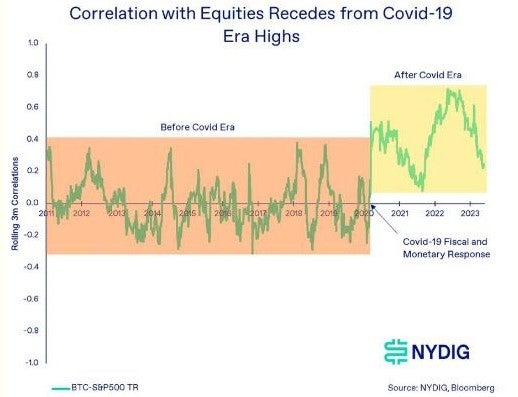Zinger Key Points
- Institutional adoption and growing maturity of the market cited as reasons for decline in correlation.
- Bitcoin's long-term returns continue to hold up as risk declines.
- Today's manic market swings are creating the perfect setup for Matt’s next volatility trade. Get his next trade alert for free, right here.
Bitcoin’s BTC/USD correlation with equities has been significantly declining as the world moves further from the peak of the COVID-19 pandemic, according to a new report.
The analysis by NYDIG, a Bitcoin services company, makes a case for Bitcoin's value in portfolio construction due to its historically high risk-adjusted returns and low correlation with other asset classes.
According to the report, before the COVID-19 pandemic, Bitcoin had almost no correlation with equities or other major asset classes, making it an attractive option for investors looking to diversify their portfolios. This era was termed the BC era (Before COVID).
However, during the pandemic, as central banks and governments responded with monetary and fiscal stimuli, the correlations soared.

The surging global money supply likely led to the simultaneous investment in various financial assets including Bitcoin, equities, bonds, and gold.
This period was referred to as the AC era (After COVID).
As the effects of the pandemic begin to diminish, there’s been a notable drop in Bitcoin’s correlation with equities. The report speculates that, although it's unlikely that the correlation will return to the absolute zero levels of the BC era, it might settle somewhere between 0.0 and 0.3.
Also Read: Binance.US Scrambles To Avert Meltdown As SEC Asset Freeze Threatens Firm's Future
This suggests that while Bitcoin is still driven by unique factors such as ownership, usage, and adoption, the change in the investor base, which now includes more professional investors, may have an enduring impact on its correlation with other asset classes.
Another significant finding in the report is the continued strong performance of Bitcoin despite a decline in its volatility.
As of the end of May, the annualized return on holding Bitcoin for 3 and 5 years was 41.6% and 29.2%, respectively. The report emphasizes that even as Bitcoin becomes a more mature asset, its risk-adjusted returns, measured by the Sharpe ratio, are still robust.
NYDIG's report also sheds light on Bitcoin’s transaction backlog.
It notes that although the backlog remains high, the demand for transaction immediacy has declined, leading to reduced fee rates.
This observation indicates that there are market-driven fluctuations in Bitcoin's transaction space, and the demand for block space is still substantial.
This report underscores Bitcoin's potential as a powerful diversifier in investment portfolios.
While its correlations with equities have changed since the outbreak of the pandemic, Bitcoin continues to be influenced by unique factors and exhibits strong long-term returns.
Read Next: Congressman Declares War On SEC's 'Tyrannical Chairman' Gary Gensler, Files Legislation To Sack Him
Photo: Shutterstock
Edge Rankings
Price Trend
© 2025 Benzinga.com. Benzinga does not provide investment advice. All rights reserved.
Trade confidently with insights and alerts from analyst ratings, free reports and breaking news that affects the stocks you care about.